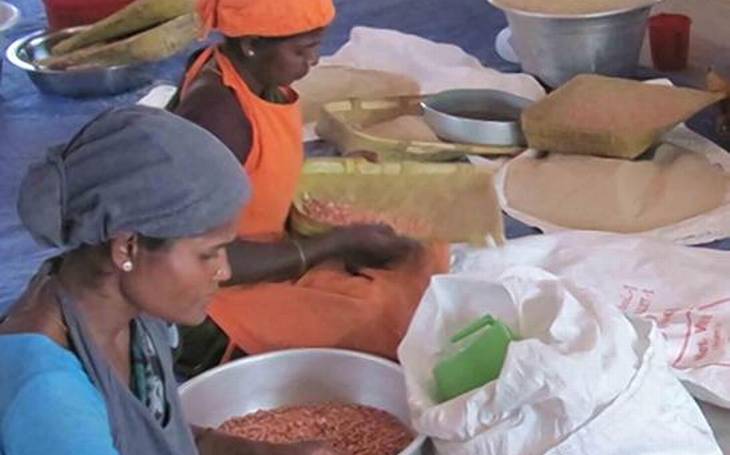
After completing his post graduation in social work, Manjunath, a native of Sittilingi, a remote village off Salem in Dharmapuri district, worked for close to five years in a textile unit in Tirupur. During this period, he got married and found that he could not make both ends meet. He decided to return to his native village for good. That was in 2003.
Today, he appears a contented person, managing the affairs of SOFA (Sittilingi Organic Farmers Association), and helping farmers draw up their cultivation plans in advance.
The association, which was formed in 2004, worked with four farmers to begin with. This number swelled to 57 in 2008. The same year, the members joined hands to form a cooperative society.
At present, around 500 farmers (each with a holding of 2.5 to 3 acres) are registered with SOFA. The area under millet cultivation in the 21 hamlets in and around Sittilingi valley is 1,200 acres. Ragi, bajra, little millet, foxtail and pearl millet are grown here. Besides millets, farmers also grow cotton, turmeric, sugarcane, groundnut and vegetables. “Until 2004, it was a struggle. Marketing was the main issue as the farmers had to take their produce to Salem, located 72 km from here, hire an auto to reach the mandi, and would end up spending more money than what they spent on the crop.
“The farmers lacked bargaining power. A doctor couple – Regi and Lalitha – who had ventured into the village during the early 1990s to cater to the medical needs of the underprivileged through the Tribal Health Initiative (THI), helped the locals come together by mooting SOFA, and later, into developing it as a business model by registering it as a cooperative society,” says Manjunath.
The association maintains a record of the crops raised by its members, and based on market demand, advises them accordingly. “This way, we ensure that members do not end up cultivating the same crop. The produce is purchased by the society and farmers are paid the market rate, plus ₹2 to 3 more per kg. The rate is determined by a separate committee,” adds Manjunath.
The society collects a membership fee annually. Five per cent of the collection is used in administration. Shanmugham, a native of Sittilingi with a 3-acre holding, conceded that he has been doing reasonably well in the last 10-12 years. Blessed with two sons and a daughter, he is a debt-free farmer. “My older son is pursuing an engineering programme in Karaikudi and my daughter is studying in an arts college in Trichy. I have managed to pay their semester fees with my farm income. We need to buy only salt to prepare food. The rest – be it chilli, rice, turmeric, vegetables – is all sourced from the field.
He owns some milch animals to take care of the family’s requirement of milk and also for grazing the field. “The waste is used as farm manure,” he added.
Village empowerment
Farmers in the valley are able to command a price for their produce. “The women folk expressed the need for some money to run the family. The idea of Self Help Groups (SHGs) was mooted. These groups were entrusted the job of cleaning the farm produce for a fee, taught to prepare value-added millet-based cookies, health-mixes, roasted powders, pappad and so on. SOFA offers services from seed to market,” says Manjunath.
More than 40 retail outlets across the country source these products from the society. According to Manjunath, the outlet at Sittilingi alone accounts for a turnover of ₹45,000-50,000 a month.
When the society took off in 2008-09, the business generated was just about ₹1 lakh. It swelled to over ₹1 crore last year. While income from the sale of millets and value-added millet products accounted for 60 per cent of the total, the rest came from sale of vegetables, organic rice, turmeric, tamarind and so on.
In 2015, with Nabard’s support, the concept of Farmer Producer Organisation was mooted. It has since been registered as a company with an authorised capital of ₹10 lakh, with equity contribution of ₹100 each from the 500 farmers and 500 women in the valley.
This FPO operates an organic fertiliser and pesticide unit, a nursery and bio-compost unit. It made a turnover of ₹25 lakh last year. Commenting on the development, Regi and Lalitha, said: “Our initial years in this valley was a struggle. We have now earned their confidence and respect. But growing millets can be a pain. At least two months ahead of harvest, the farmer will have to keep a close watch from dawn to dusk to keep birds off the field. No research institutions are thinking about tackling the bird menace,” said Lalitha.
First published by The Hindu BusinessLine
Visit another initiative offering hand-embroidered products, Porgai, located at Sittilingi and lead by Dr Lalitha Regi